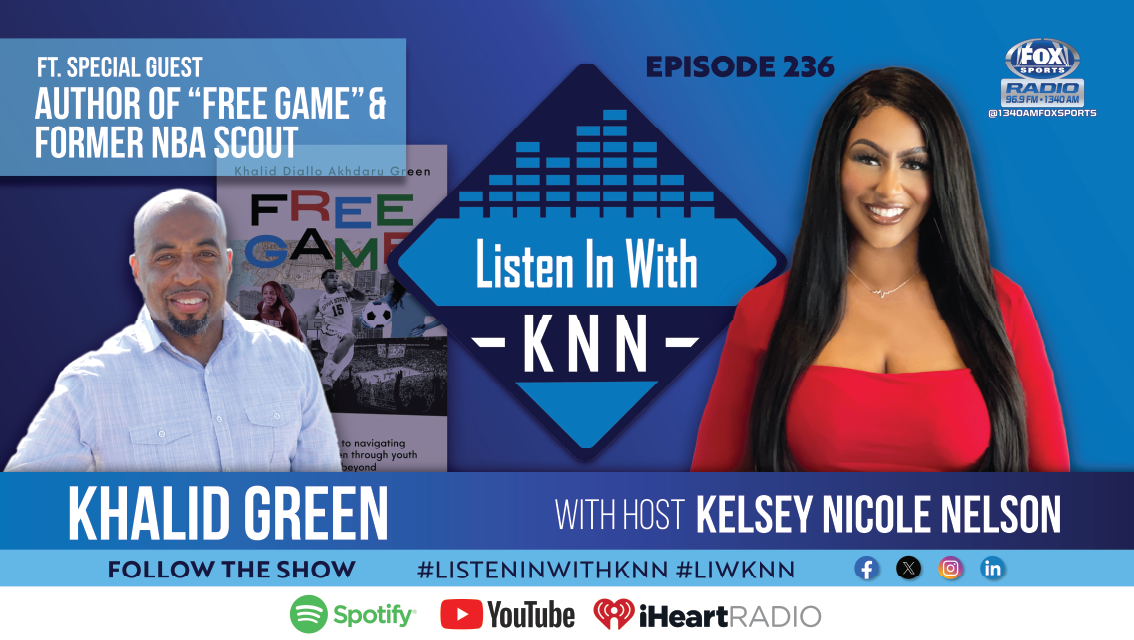On this special edition of “Listen in With KNN” presented by FOX Sports Radio, host Kelsey Nicole Nelson welcomes special guest Khalid Green, a former NBA scout and author of “Free Game” to the show.
Today, Green is the current Grassroots Program Director of Overtime Elite. According to the organization’s website, Overtime Elite (OTE) is an academic and basketball league program that gives top-ranked high school kids, aged 16 to 18 an alternative path to professional basketball. The program houses 33 players and 8 teams, including the City Reapers, RWE and Cold Hearts based in midtown Atlanta/Atlantic Station. OTE also has offices in New York. In Green’s role as the Grassroots Program Director, he recruits kids to the city of Atlanta, helping them develop in basketball. He also advocates for OTE in various spaces.
With the current landscape around recruitment being a hotbed, Nelson asked Green how he’s recruiting kids to come to Atlanta and what he’s looking for them to bring. Green answers with the following analogy, “The OTE is a Bentley car. You have to be an elite to be in the bentley.”
He further explained it means having elite basketball skills on and off the court, having high character, doing well academically, and how they represent themselves and their family. All the keys to building a multidimensional student-athlete.
Before OTE, Green, a New York native was heavily involved in the grassroots basketball scene in New York. He served as an assistant coach at three different high schools in Brooklyn, N.Y., and became head varsity coach at Bishop Loughlin High School for five years. By the time he left, Bishop Loughlin’s basketball team was in the Top 50 in the country, and appeared in two semi-finals and won the Brooklyn-Queens championship.
“Because of some of that exposure that the school got, and some of our kids got, I was able to be invited to different platforms and different camps in the basketball space,” said Green.
One of the camps was the ABCD Basketball Camp, which was at the time run by Sonny Vaccaro, a former/retired sports marketing executive. He explained the camp’s structure with each team’s assistant coaches being head high school coaches, and each team’s head coach being NBA scouts.
“After getting to know that brother and picking his brain, he was able to let me know what his job entails and what his responsibilities were,” Green said. ”It really attracted me to wanting to take my career to a different level and maybe become a scout one day.”
He said coming up in the sports management field took a lot of hustling and networking to pave his way. He got in touch with the Brooklyn Nets but started out volunteering for the first couple of years. He paid his way to attend different events and fly to different locations, trying to make a name for himself in the NBA space.
“Eventually, I was offered a consultant position. And from a consultant position, I was eventually offered a part-time position. And from a part-time position, I was eventually offered a full-time position,” said Green.
Green worked for the Nets for nine years and then took a job with the Knicks for two years. In addition to scouting, he enjoyed the community service initiatives the basketball organizations were involved in.
“I’ve always been someone who’s affiliated and entrenched in my community. I really served a purpose there for the Knicks and my community, and I did that,” said Green.
Nelson asked how Green’s love for basketball came to him. Green said ever since he was young, he grew up loving all sports and had role models in each one. For basketball, it was Julius Erving, well known as “Dr. J.” For football, it was Lawrence Taylor of the New York Giants. For baseball, it was Reggie Jackson and Isaiah Thomas.
Speaking of Reggie Jackson, Nelson asked Green to comment on Jackson’s viral testimony discussing racism he experienced as an active player in the South which triggered a wide range of emotions from many individuals who watched the broadcast live from Rickwood Field on FOX Sports.The baseball Hall of Famer attended the Major League Baseball tribute to the Negro Leagues in Alabama.
Green gave him credit for speaking the truth about the pain he went through on a public platform. “A lot of our people are scared to speak truth to power, and he was doing that,” he said.
Green wrote and released a book titled “Free Game: A Parents’ Guide to Navigating Black/Brown Children through Youth Sports and Beyond.” He created this book to share some of his experiences as a former basketball player, coach and NBA scout to connect with parents about the sports industry. He wanted to give student-athletes’ parents $20 million worth of advice for $20.
“I took it upon myself to take advantage of that time (Covid-19 pandemic) to write my book I’ve always wanted to write and put some of those answers into literature,” he said. “I’ve gotten great feedback from the parents and all types of hugs. Like ‘I’m so glad you wrote this book because it gave me a manual.’” The book can be purchased on Amazon and Barnes and Noble.
Nelson closed and asked Green for his perspective from a scout lens, of what he thought about the current state of NIL and how it impacted questions and conversations he’s had with parents. Green is glad to see college athletes getting paid (more), especially Black and Brown athletes. He also thinks there should be a balance on NIL and a passion for the game.
To hear the whole conversation, listen to the episode below!
